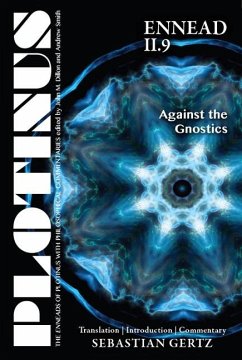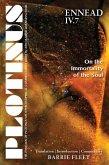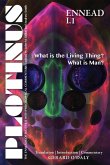"A model of clarity and scholarly judiciousness. Although this treatise marks the culmination of Plotinus' remonstrations with the literature of his Gnostic friends, the introduction makes it clear that it is in fact directed, not to the Gnostics themselves, but to those of his students sympathetic with their views, and is part and parcel of a career-long dialogue with Gnostic thinkers and practitioners. Gertz's translation is lucid, and the commentary not only clearly explains difficulties in the Greek text for the non-Greek reader, but also clarifies the course of Plotinus' argument." --John Turner, Professor of Religious Studies, Classics, and History, University of Nebraska-Lincoln "Gertz captures with precision and eloquence the Neoplatonist's meticulous attempt to defend Platonism from Gnostic interpretation and appropriation. As the locus classicus for Plotinus' refusal to concede to the onto-cosmological pessimism of the Gnostics, this text highlights the Neoplatonist's argumentative skills as he relentlessly undermines their fundamental disdain for the cosmos, and the body in general. A must for scholars in the field of Gnosticism and later Greek philosophy." --Danielle A. Layne, Assistant Professor of Philosophy, Gonzaga University "This treatise is about much more than Plotinus' refutation of the Gnostics--it is his case that a proper understanding of emanation and of the highest principles forces us to respect the sensible world as the best possible imitation of the intelligible world. Gertz's judicious analysis makes the full depth of Plotinus' thought accessible to a wider audience without getting bogged down in historical and philological minutiae." --Prof. Dr. James Wilberding, Ruhr-Universität Bochum Institut für Philosophie "Plotinus' Treatise33 offers the most detailed evidence of the philosophical debate between Pagans and Christians within the framework of a Platonic school at the beginning of the Christian era. I rejoice at Gertz's new translation and commentary which make connections both with the gnostic thought present in the indirect heresiological sources and in the direct sources, particularly in the new treatises discovered in 1945. The study of this debate in light of these new sources will bring a new appreciation of the importance of exchanges between philosophical schools and religious currents for the formation of philosophical thought in late antiquity." --Dr. Luciana Gabriela Soares Santoprete, Rheinische Friedrich-Wilhelms-Universität Bonn, Institut für Philosophie, Alexander von Humboldt Stiftung
Bitte wählen Sie Ihr Anliegen aus.
Rechnungen
Retourenschein anfordern
Bestellstatus
Storno



